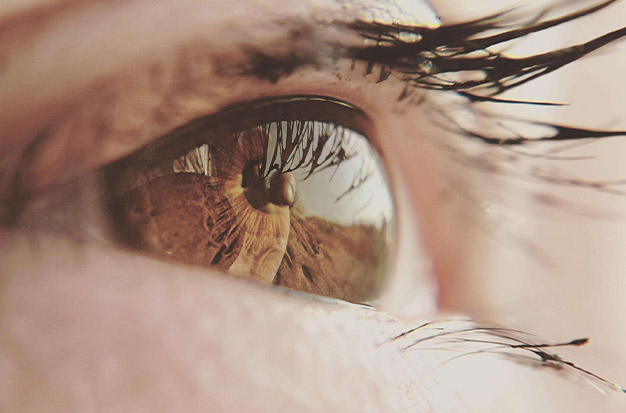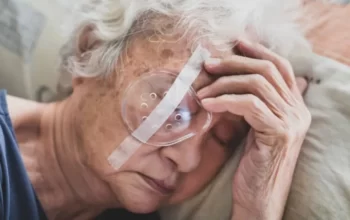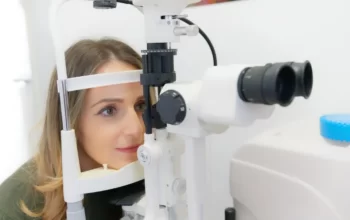
Have you ever experienced the annoyance of dry eyes? Do you worry that dry eyes can cause blindness? Most of us have experienced it to some extent because it is a common ailment. Even though it is a condition that is somewhat common and initially not that serious, if untreated, it can cause vision impairment.
Please schedule an appointment with us if you believe you may have dry eye syndrome. The earlier dry eye is identified and treated, as with most eye conditions, the more likely it is that your vision will be preserved. We’re prepared to provide your eyes with some well-deserved relief with our cutting-edge dry eye treatment facilities. Make a consultation appointment today to get rid of your dry eye symptoms.
What Is Dry Eye?
A very common eye condition that affects 16 million Americans is dry eye, also known as dry eye syndrome. When your eyes don’t produce enough tears to keep themselves adequately moist, dry eye develops. or if the tears your eyes shed are not of high quality. Irritation, redness, and blurred vision may be brought on by this imbalance.
It may appear that dry eyes are nothing more than a nuisance. But this isn’t the case because untreated dry eye can cause serious health issues like infection and even corneal scarring. Therefore, get in touch with us if your dry eye symptoms continue before it damages your eyes.
Dry Eye Risk Factors & Symptoms
Some people are more likely to develop dry eye disease than others, despite the fact that it can have a variety of causes. If you:
- Are least 50 years of age
- Wear contact lenses
- Spend too much time looking at digital screens without taking breaks
- Take certain medications, like antihistamines, blood pressure regulators, and antidepressants
- Have diabetes
Dry Eye Symptoms
The following are the most typical symptoms of dry eye disease:
- Itchiness
- Redness
- Watery eyes
- Blurred vision
- Burning sensation
Why Do People Get Dry Eyes?
- Anybody may experience dry eyes if the surrounding air is extremely dry or if the air conditioner is on all the time. You can get a clear response by using a hygrometer to gauge the humidity in your home. Consider getting a humidifier if you have no other choice but to improve your ventilation.
- In part because of the Meibomian glands’ declining function, the likelihood of developing dry eyes increases with age. The cornea could also lose some of its sensitivity, and your blood’s hormone levels could alter.
- Dry eyes can also result from side effects of anti-depressants, diuretics, hypertension drugs, and many others
- Working a lot in front of a computer may cause the normal blink reflex to lessen, which increases the risk of dry eyes.
- Finally, autoimmune diseases, irregularities in the surface of the eye, or inflammatory reactions can also be the cause.
The Dangers Of Untreated Dry Eye
Even though dry eye disease might not seem like a serious problem, if left untreated, it can seriously harm your eyes and have a negative impact on your quality of life. Conjunctivitis, difficulty reading, inability to wear contacts, difficulty driving, and lesions on your eyes known as “corneal ulcers” can all result from untreated dry eye disease.
These severe corneal lesions can result in scarring of the cornea. The cornea’s ability to precisely focus light is hampered by this scarring, which impairs your vision. If the underlying dry eye disease that caused this corneal injury is not treated, it may result in blindness in some people.
Can Dry Eye Cause Blindness?
When treated, mild to moderate cases of dry eye is unlikely to result in infection that results in blindness or permanent damage.
The cornea, the transparent outer layer of the eye, may become damaged in more severe cases of dry eye. Vision impairment may result from damage there.
In addition to resulting in blindness, corneal damage can cause vision to become hazy or blurry. The majority of the time, in low- or middle-income countries, corneal damage is a major contributor to blindness worldwide.

Can Other Vision Issues Be Brought On By Dry Eye?
From slight vision impairment to total blindness, dry eye can have a range of effects.
Blurred vision, sensitivity to light, and increased tear production are just a few of the signs and symptoms of dry eye. These signs should disappear with treatment.
Dry eye disease that is more severe or left untreated can cause permanent vision loss, including blindness.
If someone has symptoms of dry eye, they should consult an eye doctor so they can receive treatment for the condition and reduce the possibility of complications.
Can Dry Eye Harm Your Eyes Permanently?
If the cornea is scratched, dry eye can result in long-term harm. Minor abrasions should heal without leaving scars, but scars can impair vision for a considerable amount of time.
Several treatments may be suggested by a doctor if the cornea is damaged. Possible choices are as follows:
- eye patches
- ointments or drops
- special contact lenses
- anti-inflammatory eye drops
- antibiotics
- autologous serum tears
The doctor might advise a corneal transplant to help restore clear vision if these treatments don’t work. A surgeon replaces the damaged cornea with donor tissue after removing all or part of it during this procedure. The majority of corneal transplants are initially successful, but some may fail because the immune system rejects the implant.
Reversing Dry Eye Is It Possible?
The majority of people will occasionally experience dry eyes. Acute dry eye may have several causes, including:
- staring at a computer, TV, tablet, or smartphone screen for extended periods
- dry air
- changes in the weather
- allergies
- pollutants
Usually, eliminating or treating the trigger will provide relief for someone who is suffering from an acute case of dry eye. For instance, over-the-counter (OTC) allergy medications may offer relief to a person who suffers from dry eye brought on by allergens. If someone spends their workdays glued to a computer, they might find that regular screen breaks help their symptoms.
There are several causes of chronic dry eye. These are some of the potential causes:
- underlying medical conditions, such as rheumatoid arthritis, diabetes, or Sjögren’s disease
- the use of certain medications, such as blood pressure medications or antidepressants
- complications from surgery or long-term contact use
- aging, as dry eye tends to occur more frequently as a person ages
- sex, as dry eye is more common in females due to the hormonal changes that result from pregnancy, birth control pills, and menopause
Taking care of underlying medical issues or switching prescription drugs may help prevent dry eye. To help avoid complications, a person with dry eye will probably need ongoing treatment.
What Steps Can You Take To Prevent Dry Eyes?
Humidifier: In addition to easing the symptoms of dry eyes, using a humidifier helps maintain the air’s natural moisture level. In dry spaces like those with air conditioners or heaters, a humidifier can be useful.
Avoid low humidity conditions (if possible): The use of hair dryers, strong winds, and cigarette smoke should all be avoided. Limit forced air heating, forced air cooling, windy days, and times when the heater or defroster are on in vehicles.
Take frequent screen breaks: It’s important to keep in mind to blink frequently and give your eyes frequent breaks from staring at the screen (every 20 minutes) when using a computer or other electronic device.
Drink water: Make sure to drink plenty of water to keep your body and eyes hydrated.
Eyelid Care: If the cause of your dry eye is eyelid irritation, your eye doctor may recommend warm compresses on the eye, massaging your eyelids, or eyelid cleansers
Talk to your eye care professional: Consult your eye care provider about your options if your dry eye is caused by an eye condition, such as contact lens wear or recurrent use of glaucoma eye drops. Taking vitamins or supplements might be able to lessen your dry eye symptoms, which you can also discuss with your eye care specialist.
Over-the-counter eyedrops and ointments: Artificial tears are over-the-counter substitutes for tear films that are sold in all pharmacies.” These eyedrops may improve the moisture of the eye by substituting for the natural tear film of the eye. There are many different brands of artificial tears available with various ingredients, including versions with and without preservatives. Applying ointments before bed can help keep your eyes lubricated all night. Regular use of these medications, especially those containing preservatives, over an extended period of time may result in toxic irritability or even allergic reactions. The symptoms of dry eye can be lessened by over-the-counter artificial tears solutions, but dry eye is not treated by them. Before using any eye drops, including these, it’s important to consult a doctor of ophthalmology. It’s important to properly use your eyedrops.
Prescription medications: A prescription eye drop that will encourage your eyes to produce more tears may be recommended by your eye doctor if you have a more severe case of dry eye.
Tear duct plugs: When the tear film is excessively drained from the eye before it has a chance to hydrate the eye, dry eye can result. Your eye doctor may insert plugs into the tear ducts near the inner corners of your eyes to help keep tears in the latter. If necessary, the plugs can be taken out.
Surgery: Some believe that having too-loose bottom eyelids contributes to dry eye. Your eye doctor might advise surgery to make your eyelids tighter so that tears stay in your eyes.
Conclusion
If dry eye is not treated, it can result in vision loss and even blindness. If dry eye symptoms persist, a person should consult a doctor. Medications, lifestyle changes, and any underlying causes can all be treated by doctors.
Treatment can help stop symptoms from getting worse and complications like vision loss.



